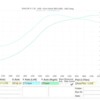Have a few Qs
quote:
I purchased the car with a built and stroked 377 with the Australian 2v heads ported.
So was it an engine purpose built for boost? Or was this a normally aspirated stroker? Do you know present static compression ratio and cam?
quote:
I have the car running on twin T66 turbo's, and we ran it at 10psi up to 6krpm, it isn't even thinking about laying down. It made 630hp to the tires on pump gas, and looked to hit 650 if I spun it to 6500.
How are you managing detonation risk. Intercooled? Alcohol?
quote:
I know the rods and pistons are up to the task,...
Aftermarket I take it as a result of stroker. Is it an offset ground stock crank with Chevy journals?
quote:
but am a little concerned about the main/rod bearings the most.
A well founded concern. Is this a solid cam with oil control mods? Restrictors? Bushed lifters? If you're making 630hp at the wheels with a stock Cleve block, that would suggest mid 700s at the flywheel. You didn't mention what the bore is sitting at but considering it was stroked, I'm guessing it's at least .030" over. Also didn't mention 2 or 4 bolt main but really doesn't matter much in a standard cleve block. IMO, if you intend to regularly tap that power, I think it's a matter of time before you grenade, especially if you keep pushing the rpm limit North. You will likely find that limit is cylinder wall or lower end failure. With that kind of investment in your build, a good bottom end and aftermarket block would be a wise investment. I understand the concept of "It's Never Enough", but 630hp at the wheels of a street car, especially Pantera, is fairly interesting. Might want to pause there and enjoy for a while before heading North on the power curve with that build.
You might want also to seek out Dave Doddek. He has been this itterative route on boost.
-My 2 cents.
Kelly


